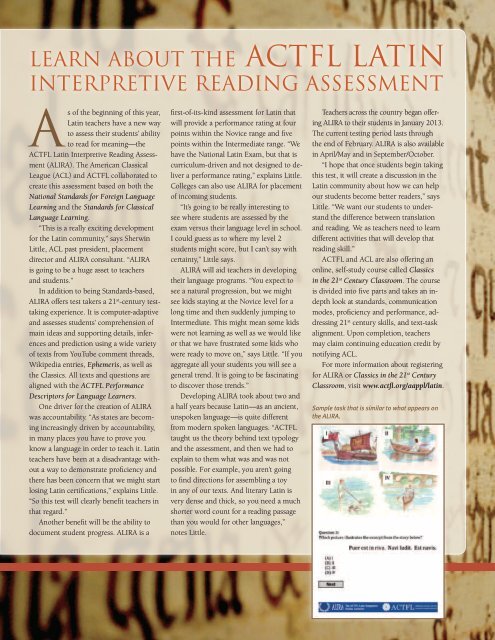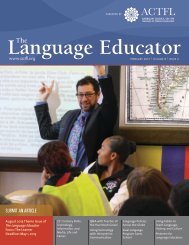You also want an ePaper? Increase the reach of your titles
YUMPU automatically turns print PDFs into web optimized ePapers that Google loves.
Learn About the ACTFL Latin<br />
Interpretive Reading Assessment<br />
As of the beginning of this year,<br />
Latin teachers have a new way<br />
to assess their students’ ability<br />
to read for meaning—the<br />
ACTFL Latin Interpretive Reading Assessment<br />
(ALIRA). The American Classical<br />
League (ACL) and ACTFL collaborated to<br />
create this assessment based on both the<br />
National Standards for Foreign Language<br />
Learning and the Standards for Classical<br />
Language Learning.<br />
“This is a really exciting development<br />
for the Latin community,” says Sherwin<br />
Little, ACL past president, placement<br />
director and ALIRA consultant. “ALIRA<br />
is going to be a huge asset to teachers<br />
and students.”<br />
In addition to being Standards-based,<br />
ALIRA offers test takers a 21 st -century testtaking<br />
experience. It is computer-adaptive<br />
and assesses students’ comprehension of<br />
main ideas and supporting details, inferences<br />
and prediction using a wide variety<br />
of texts from YouTube comment threads,<br />
Wikipedia entries, Ephemeris, as well as<br />
the Classics. All texts and questions are<br />
aligned with the ACTFL Performance<br />
Descriptors for Language Learners.<br />
One driver for the creation of ALIRA<br />
was accountability. “As states are becoming<br />
increasingly driven by accountability,<br />
in many places you have to prove you<br />
know a language in order to teach it. Latin<br />
teachers have been at a disadvantage without<br />
a way to demonstrate proficiency and<br />
there has been concern that we might start<br />
losing Latin certifications,” explains Little.<br />
“So this test will clearly benefit teachers in<br />
that regard.”<br />
Another benefit will be the ability to<br />
document student progress. ALIRA is a<br />
first-of-its-kind assessment for Latin that<br />
will provide a performance rating at four<br />
points within the Novice range and five<br />
points within the Intermediate range. “We<br />
have the National Latin Exam, but that is<br />
curriculum-driven and not designed to deliver<br />
a performance rating,” explains Little.<br />
Colleges can also use ALIRA for placement<br />
of incoming students.<br />
“It’s going to be really interesting to<br />
see where students are assessed by the<br />
exam versus their language level in school.<br />
I could guess as to where my level 2<br />
students might score, but I can’t say with<br />
certainty,” Little says.<br />
ALIRA will aid teachers in developing<br />
their language programs. “You expect to<br />
see a natural progression, but we might<br />
see kids staying at the Novice level for a<br />
long time and then suddenly jumping to<br />
Intermediate. This might mean some kids<br />
were not learning as well as we would like<br />
or that we have frustrated some kids who<br />
were ready to move on,” says Little. “If you<br />
aggregate all your students you will see a<br />
general trend. It is going to be fascinating<br />
to discover those trends.”<br />
Developing ALIRA took about two and<br />
a half years because Latin—as an ancient,<br />
unspoken language—is quite different<br />
from modern spoken languages. “ACTFL<br />
taught us the theory behind text typology<br />
and the assessment, and then we had to<br />
explain to them what was and was not<br />
possible. For example, you aren’t going<br />
to find directions for assembling a toy<br />
in any of our texts. And literary Latin is<br />
very dense and thick, so you need a much<br />
shorter word count for a reading passage<br />
than you would for other languages,”<br />
notes Little.<br />
Teachers across the country began offering<br />
ALIRA to their students in January 2013.<br />
The current testing period lasts through<br />
the end of February. ALIRA is also available<br />
in April/May and in September/October.<br />
“I hope that once students begin taking<br />
this test, it will create a discussion in the<br />
Latin community about how we can help<br />
our students become better readers,” says<br />
Little. “We want our students to understand<br />
the difference between translation<br />
and reading. We as teachers need to learn<br />
different activities that will develop that<br />
reading skill.”<br />
ACTFL and ACL are also offering an<br />
online, self-study course called Classics<br />
in the 21 st Century Classroom. The course<br />
is divided into five parts and takes an indepth<br />
look at standards, communication<br />
modes, proficiency and performance, addressing<br />
21 st century skills, and text-task<br />
alignment. Upon completion, teachers<br />
may claim continuing education credit by<br />
notifying ACL.<br />
For more information about registering<br />
for ALIRA or Classics in the 21 st Century<br />
Classroom, visit www.actfl.org/aappl/latin.<br />
Sample task that is similar to what appears on<br />
the ALIRA.



